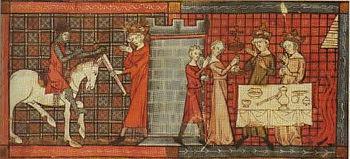
I found “The Waste Land” to be an incredibly mournful reading experience, even whilst I was often lost amid T.S. Eliot’s constant barrage of opaque references. At least he is helpful enough to provide some background information, for which I was quite grateful. I am sure none of us could help but notice that Eliot’s quotations are drawn from all over (from Dante’s Inferno to Plato’s Philebus, apparently), but the allusions I was most struck by were chiefly those medieval in origin. The first four lines, for instance, reflect quite obviously those of Chaucer’s Canterbury Tales, which reads, “Whan that aprill with his shoures soote / The droghte of march hath perced to the roote, / And bathed every veyne in swich licour / Of which vertu engendred is the flour” (l. 1-4). However, where in Chaucer these lines express a beautiful ardor for the coming of springtime, Eliot’s reimagining of these lines takes quite a different tone, for he notes that “April is the cruelest month, breeding / Lilacs out of the dead land, mixing / Memory and desire, stirring / Dull roots with spring rain” (l. 1-4). What I find fascinating about this comparison is not that Chaucer and Eliot view the springtime so very differently, but how their accounts are remarkably similar in particulars, and yet extremely distant from one another in feeling. This is because, although both remark upon the new growth and life, for Eliot, the new growth of spring appears to be unwelcome, as the reemergence of warmth and growth is cruelly “mixing / Memory and desire” (2-3). This sentiment is confirmed in the very next lines, for “Winter kept us warm, covering /Earth in forgetful snow” (5-6). From these lines, and my own knowledge of the time in which they were written (1922), my impression is that winter was welcome and brought “warmth” of a sort for its numbing ability, while the bright lilacs, springing forth so callously from the land in which thousands of men lie dead at the end of WWI, inspires in the speaker an impression of the “cruelty” of April. This sentiment reminds me very much of Vera Brittain’s Testament of Youth, when she is indignant and even horrified that the seasons carry on, and flowers still bloom, and the sun breaking through the clouds continues to be just as beautiful as it ever was, even though all of her most beloved companions have died.
Further, T.S. Eliot very openly incorporates elements of the Arthurian tale of the Fisher King often found within the Grail legend into the poem—“While I was fishing in the dull canal” (l. 189), “ I sat upon the shore / Fishing, with the arid plain behind me” (l. 424) —even to the point of likely taking his title from Malory’s account in Le Morte d'Arthur. In the Arthurian tradition, the Fisher King has been afflicted by a grievous wound that never heals, and his ailment also often passes to his kingdom, which becomes a verifiable wasteland (whether this is because the kingdom has been simultaneously cursed, or simply because it falls into disrepair because their king is unable to perform his sovereign duties varies from tale to tale). It is up to one of King Arthur’s Knights of the Round Table, Perceval, to uncover the mystery of his ailment and heal both king and kingdom. According to his own note, Eliot has taken most of his inspiration from the discussion of the Grail legend in Jessie Weston’s book, From Ritual to Romance, which focuses upon the pagan influences of a legend which apparently, at times, ends in Perceval healing the Fisher King and restoring the kingdom to its former health and glory. This may be a somewhat hopeful undercurrent amidst Eliot’s bleak tone, if so, but I cannot help but think of that version of the legend I myself was first introduced to: the unfinished Romance of Chrétien de Troyes: "Perceval, the story of the Grail." In this account Perceval, having failed to offer the proper courtesy to the Fisher King by asking after his wound and the marvel of the Grail he has seen, wakes up alone, the king and his court vanished, and the tale soon after breaks off, incomplete. I can’t help but feel that this version of the tale—in which all is not quite lost, but certainly much has gone awry, contrary to every hope and expectation—is very suited to the tone of Eliot’s poem, written very close to the end of WWI. I wonder, now, if I was most astonished by these allusions to medieval writers because they seem to my mind furthest from the brutality of the war. And yet, after all, surely the chivalric romances of Chrétien de Troyes captivated and even motivated the hearts of many a young soldier, just as they have my own. Even residing here in a tumultuous present I have always had the available retreat of the chivalric tales of old. I honestly cannot imagine living through a moment in which my own ideals concerning what is beautiful and worthwhile were so utterly desecrated.
